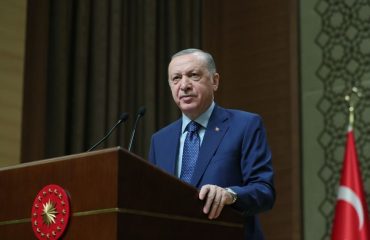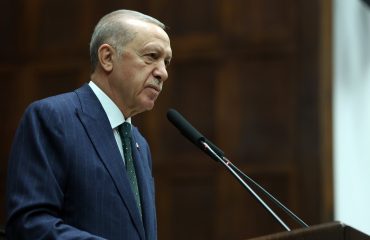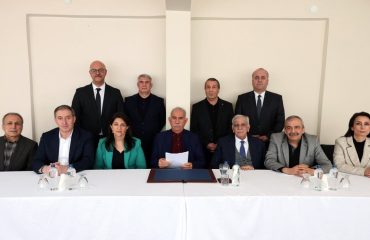
Abu Bakr al-Baghdadi’s suicide during the U.S. military operation to catch him in Syria on October 26 has closed a bloody page not only in the Syria civil war but also in the international struggle against terrorism. The elimination of one of the most brutal terrorist leaders in modern times was carried out by the American commandos, as it was announced on October 27 by U.S. President Donald Trump. As Moscow said, if it was really Baghdadi who killed himself, it is a victory for Trump.
It was a surprise for many circles in the West that Trump also thanked Turkey, as well as Russia, Syria, Iraq and the Syrian Kurds for their cooperation. Throughout the day, there was this social media campaign implying that Baghdadi was stopped by the Americans, thanks to the intelligence supplied by the YPG/PKK and that otherwise, he would make his way to Turkey. Revealing that Turkish airspace was also used by eight U.S. helicopters carrying out the operation, Trump said that Turks knew where they were heading to and the cooperation was “terrific”.
The Turkish Defence Ministry said U.S. counterparts contacted them on the night of October 26; the requests, reportedly, were met “within the spirit of Alliance and strategic partnership” and the Turkish troops in the area were warned. News reports are stating that the Turkish troops in Syria’s Idlib area withdrew towards the Turkish border before the U.S. operation. President Tayyip Erdoğan said that “Having paid the dearest price in the fight against Daesh, PKK/YPG, and other terrorist organizations, Turkey welcomes this development”.
The Turkish role: was Incirlik used?
Trump underlined in his statements that neither Russia nor Turkey and others were given any details about the secret operation; they did not ask either.
Following Trump’s words about the Turkish contribution, the questions focused on whether Turkey’s strategic Incirlik airbase, which is open for anti-ISIS coalition operations since 2015 and which is close to the operation area, was used at all in the U.S. commando operation. A high-ranking security source, who asked not to be named, told YetkinReport that Incirlik was not used in the operation but that the air space was coordinated between the Turkish and U.S. militaries.
Military experts say that the Turkish air space might also be used for U.S. planes and helicopters patrolling in the area for search-and-rescue operations, just in case.
A military analyst told YetkinReport that Americans might have missed Baghdadi during an August 31 raid in certain areas of Syria’s Idlib province, and not let Russia or Turkey know. And they might have chosen to cooperate this time, because of the failure of that operation.
The doubt raised by “General Mazloum”
The suspicions speculated about Turkey in especially Western social media throughout the day on October 27, right until Trump mentioned Turkey as cooperator, was partly fueled by “General Mazloum” of the YPG forces (or the SDF) in Syria. Mazloum said that the Baghdadi operation was made possible with the intelligence cooperation between YPG and the U.S. That is amid unconfirmed claims about the involvement of the YPG facilities in Kobane in the Baghdadi operation.
In Ankara, government circles believe that the role of YPG and Mazloum Abdi, (aka. Şahin Cilo, aka. Ferhad Abdi Şahin) was amplified on purpose in order to promote YPG’s declining profile in Syria and his profile as an alternative for armed Kurdish movements from within the PKK. As a result of a military campaign into Syria launched on October 9 against the possibility of the YPG (or PKK) threats across the border, Erdoğan reached a deal with the U.S. Vice President Mike Pence on October 16, and then with Russian President Vladimir Putin on October 22, to push the YPG 30 km away from its borders.
That was followed by Trump praises for Mazloum and Russian Defense Minister Sergey Shoigu having a video conference with him as counterparts, which upset Ankara. When the reasons are asked to the American sources the answer is that they now want to use the YPG as a ground force to protect oil fields from getting into ISIS, or Iranian hands. When it is asked to Russians the answer is that they want to avoid engagement with the YPG and want to convince them to get away from the Turkish border. An alternative scenario in both American and Russian minds could be to convince Mazloum to split from the PKK and set his new Kurdish party in Syria; a highly complicated matter.
Turkey and the ISIS problem
Turkey’s problem with the U.S. over the YPG has started when the former U.S. President Barack Obama picked them as the ground force against ISIS despite Erdoğan’s objections. The U.S. had then started to provide arms, money and military training, which infuriated Turkey further.
Turkey, on the other hand, failed to perceive the ISIS threat with all its dimensions, especially at the beginning, in 2013-2014, taking it as just another Islamist rebel organization like the Moslem Brotherhood. The picture started to change in June 2014 when ISIS militants raided Turkey’s Mosul consulate in Iraq and captured 49 people there, including the Consul General. Turkey opened its bases for the use of the anti-ISIS coalition in June 2015, after Obama picked the YPG as his partner against ISIS. In October 2015 ISIS carried out Turkey’s biggest terror attack in Ankara killing 103 and wounding 500 with two suicide bombers. In 2016 ISIS killed 42 people in Istanbul’s Atatürk airport and 39 people in Istanbul’s Reina club on that new years’ night. In 2016, Turkey carried out its first incursion into Iraq against ISIS strongholds as Jarablus, Dabiq and al-Bab. The second, in early 2018, was against the YPG in Afrin.
The Baghdadi operation lifted another obstacle off of the political solution in Syria, which is the possibility of the establishment of a Kurdish state from within its territories. The operation took place a few days before the talks on a new constitution for Syria on October 30 in Geneva. That created new opportunities for all sides to focus on political solutions rather than proxy wars and a chance to not repeat the former mistakes.


